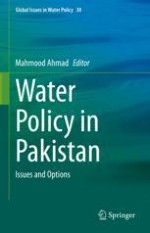2023 | OriginalPaper | Buchkapitel
3. Water Resource Potential: Status and Overview
verfasst von : Mohsin Hafeez, Usman Khalid Awan
Erschienen in: Water Policy in Pakistan
Aktivieren Sie unsere intelligente Suche, um passende Fachinhalte oder Patente zu finden.
Wählen Sie Textabschnitte aus um mit Künstlicher Intelligenz passenden Patente zu finden. powered by
Markieren Sie Textabschnitte, um KI-gestützt weitere passende Inhalte zu finden. powered by
